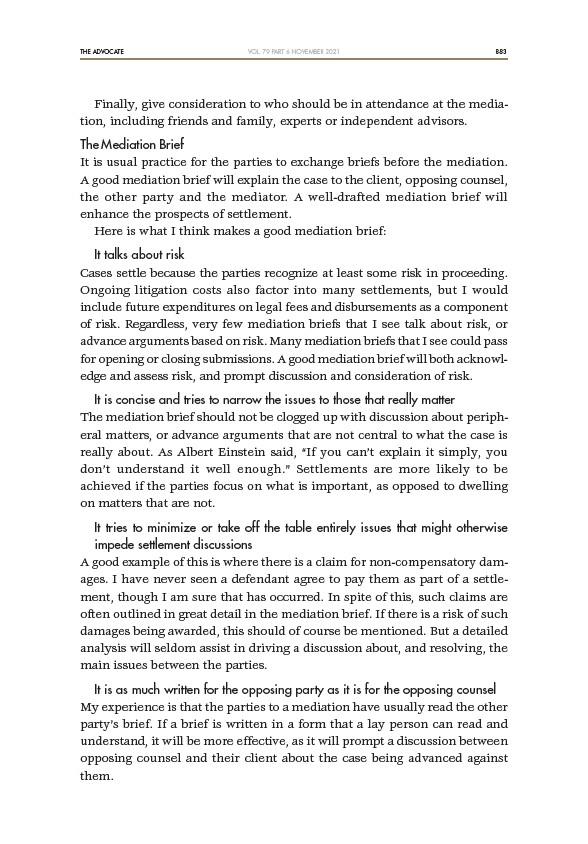
THE ADVOCATE 883
VOL. 79 PART 6 NOVEMBER 2021
Finally, give consideration to who should be in attendance at the mediation,
including friends and family, experts or independent advisors.
The Mediation Brief
It is usual practice for the parties to exchange briefs before the mediation.
A good mediation brief will explain the case to the client, opposing counsel,
the other party and the mediator. A well-drafted mediation brief will
enhance the prospects of settlement.
Here is what I think makes a good mediation brief:
It talks about risk
Cases settle because the parties recognize at least some risk in proceeding.
Ongoing litigation costs also factor into many settlements, but I would
include future expenditures on legal fees and disbursements as a component
of risk. Regardless, very few mediation briefs that I see talk about risk, or
advance arguments based on risk. Many mediation briefs that I see could pass
for opening or closing submissions. A good mediation brief will both acknowledge
and assess risk, and prompt discussion and consideration of risk.
It is concise and tries to narrow the issues to those that really matter
The mediation brief should not be clogged up with discussion about peripheral
matters, or advance arguments that are not central to what the case is
really about. As Albert Einstein said, “If you can’t explain it simply, you
don’t understand it well enough.” Settlements are more likely to be
achieved if the parties focus on what is important, as opposed to dwelling
on matters that are not.
It tries to minimize or take off the table entirely issues that might otherwise
impede settlement discussions
A good example of this is where there is a claim for non-compensatory damages.
I have never seen a defendant agree to pay them as part of a settlement,
though I am sure that has occurred. In spite of this, such claims are
often outlined in great detail in the mediation brief. If there is a risk of such
damages being awarded, this should of course be mentioned. But a detailed
analysis will seldom assist in driving a discussion about, and resolving, the
main issues between the parties.
It is as much written for the opposing party as it is for the opposing counsel
My experience is that the parties to a mediation have usually read the other
party’s brief. If a brief is written in a form that a lay person can read and
understand, it will be more effective, as it will prompt a discussion between
opposing counsel and their client about the case being advanced against
them.